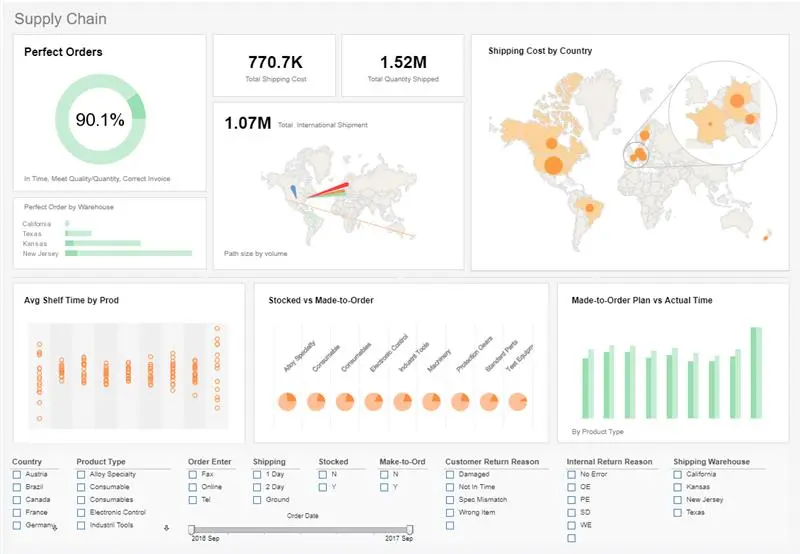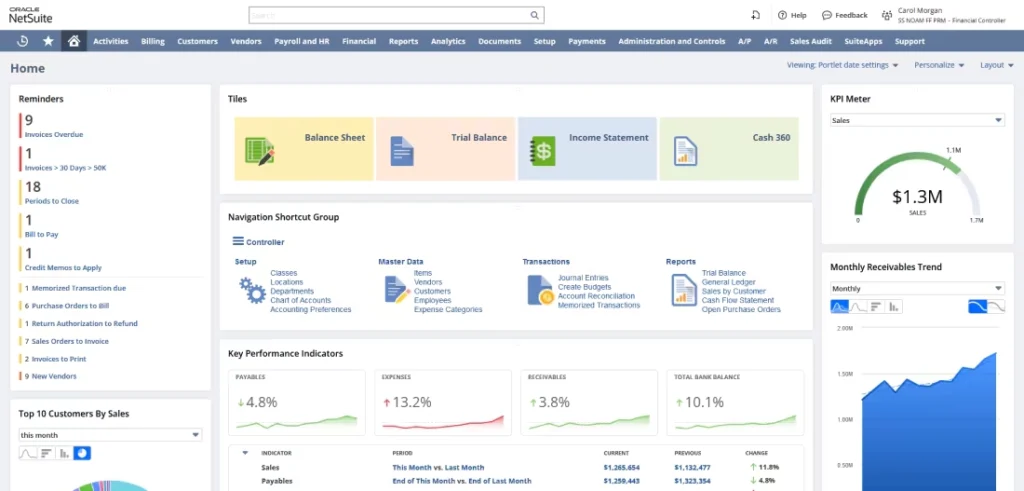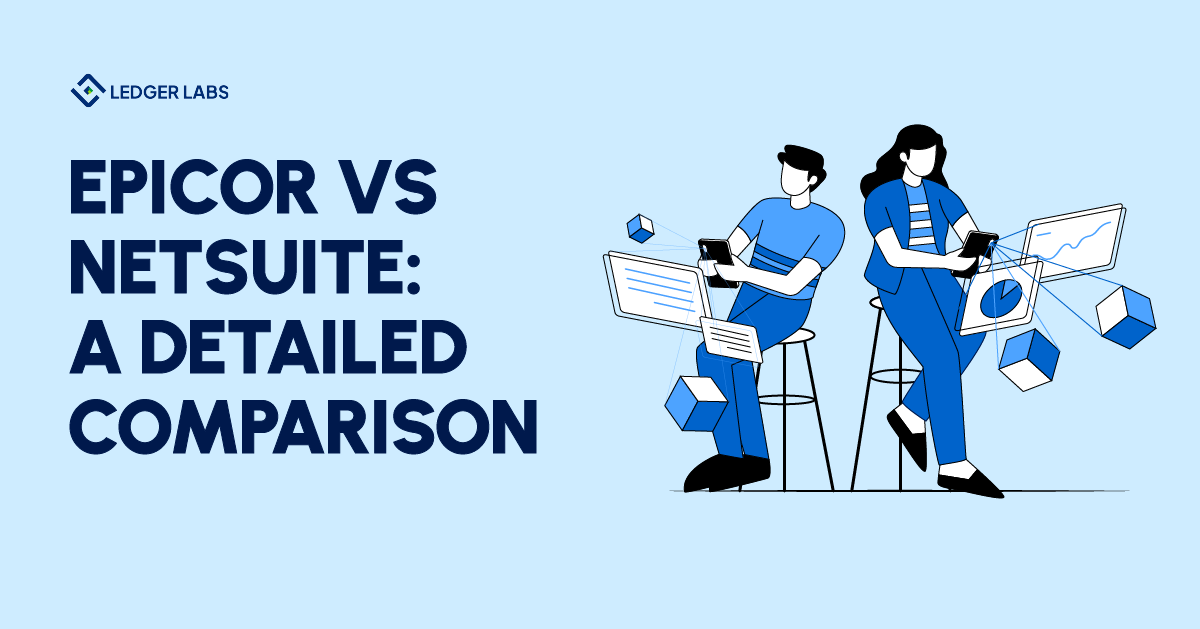If you’re running a business, you know how important it is to have the right tools to manage numerous operations.
A user-friendly and multi-purpose ERP software can simplify your core processes.
Two popular ERP solutions on the market today are Epicor and NetSuite.
While Epicor excels in manufacturing and supply chain management, NetSuite is better suited for organizations needing a fully integrated cloud-based system.
But the main question is —which ERP is the right fit for your business?
The best way to decide is to compare Epicor vs NetSuite based on their features to see which one aligns best with your needs.
Here’s a detailed analysis of these tools.
- Epicor ERP streamlines business operations for better efficiency
- It supports multiple deployment options: cloud, on-premise, and hybrid
- The system offers strong financial, supply chain, production, and project management tools
- Customization is possible but requires technical expertise
- Implementation can be costly and time-consuming, so businesses need expert support for a smooth transition to ERP Epicor
Epicor: Why do businesses use it?
Epicor ERP is a business management solution designed to help companies with manufacturing, distribution, and retail processes.
So, you can manage everything from production and inventory to customer relationships and financials—all in one system.
Let’s say you own a manufacturing company. You need to track raw materials, manage production schedules, and verify whether your finished products are delivered on time. This tool has the ability to do all these tasks smoothly.
Thanks to its popularity in the manufacturing sector, approximately 40% of Epicor’s customers are from this industry.
The software also has a large global presence. It serves over 21,000 small and medium-sized businesses in 34 countries. These industries include automotive, electronics, and industrial machinery.
Last year, Epicor generated more than $1 billion in annual recurring revenue, driven by increased adoption of AI tools among enterprise customers.
This strong market presence indicates how reliable the software is.
Let’s explore how you can use Epicor:
1. Centralized business data
Epicor, a robust ERP system for most businesses, stores all business data in one place. This means different departments can access the same, up-to-date information whenever needed.
For example, if your sales team confirms a large order, the production team can instantly see it and start preparing the required inventory. At the same time, the finance department can track payments and generate invoices for customer orders.
Since all these tasks can be done in one platform, you can eliminate miscommunication across all these departments.
2. Better inventory management
One of the biggest challenges for businesses is managing stock levels. Holding too much inventory ties up money, while running out of stock means lost sales.
Epicor helps businesses maintain the right balance.
It tracks stock in real time, so you always know what’s available and when to reorder.
For instance, if demand for a product spikes, the software alerts you so you can restock before running out.
This feature is especially beneficial for manufacturers who need raw materials on time to keep production running at all times.
3. Streamlined manufacturing operations
A large number of manufacturers use Epicor as their go-to tool as it makes production planning easier.
From ordering the raw materials to quality control, the tool helps businesses manage everything in one single dashboard.
This flexibility helps organizations deliver high-quality products on time that meet industry standards.

4. Improved financial management
A dependable financial management system is the foundation of a successful business.
You can use Epicor’s Financial tool to simplify your key accounting tasks.
Whether to calculate production costs or set the right prices for your products, Epicor has you covered.
It can also generate financial reports, making it easier to understand your company’s performance and future growth plans.
5. Better customer service
Good customer service is key to retaining clients and growing a business.
Epicor helps businesses keep track of client orders, preferences, and past interactions.
So, if your customer calls to check their order status, your team can quickly find all the details in the system.
You can get accurate updates instead of searching through different processes.
This improves response time and makes customers feel valued, which can lead to repeat business.
6. On-premise and cloud options
Epicor gives businesses a choice on how they want to use the software.
You can install it on your own servers (on-premise) or use it online (cloud-based).
What makes NetSuite stand out?
Another popular ERP system used by a number of organizations is NetSuite.
It has a huge global reach.
More than 41,000 customers across 219 countries use NetSuite for their operations, making it a top SaaS multi-tenant cloud ERP solution.
Here are a few reasons why organizations choose NetSuite:
1. Flexible and scalability
Speed and flexibility are key features that most businesses using accounting tools demand.
NetSuite is built for organizations that need faster decision-making and a more centralized workflow.
Since it’s cloud-based, everything runs from one central system, making it easier to respond to market changes.
Whether you’re adjusting pricing, managing stock, or launching new products, you get real-time data to make informed decisions on the spot.
2. Save money in the long run
While some businesses worry about the upfront cost of switching to NetSuite, the long-term savings often outweigh the initial investment.
Because everything is managed in the cloud, you don’t need expensive IT infrastructure when your business grows.
Additionally, you won’t have to invest in multiple systems, directly reducing unnecessary expenses.
3. Always up-to-date
Technology is always changing, and keeping up with the same can not only be expensive but also time-consuming.
One of the best features of NetSuite is that it keeps updating itself automatically, so you don’t have to worry about upgrading.
This means your business is always running on the latest technology without you putting too much effort into it.
4. Give customers a better experience
We all know that a happy customer is a returning customer.
In order to provide your clients with a service worth remembering, you need all of their data synchronized and easily accessible.
This is NetSuite’s strongest suite.
The software helps businesses improve client relationships by integrating all customer-related data—sales, orders, and interactions—into one system.
5. Smarter decisions with real-time insights
Accurate information is the basis of good decisions for any business, no matter the size.
NetSuite’s dashboards show in-depth reports on sales, expenses, and overall business performance, so you don’t have to rely on guesswork.
From profit margins and stock levels to upcoming orders, all data is always up-to-date in the software. This convenience lets organizations plan systematically and stay profitable, no matter the circumstances.

6. Smooth integration with third-party apps
Businesses use multiple tools for their operations and NetSuite can integrate them seamlessly into its platform.
Using pre-built connectors in NetSuite, You can integrate popular platforms like Shopify, Salesforce, Oracle, Wix, Magneto, Marketo, and more.
Otherwise, companies can integrate their custom applications and services with NetSuite to customize them to their exact needs. They can do this using NetSuite’s API access, specifically through its “SuiteTalk” web services.
Epicor Vs NetSuite - Comparing their functionalities
When comparing NetSuite vs Epicor, understanding their key features can help you decide which solution aligns best with your business needs. Here are some standout features to consider.
1. Deployment Options
Deployment options dictate how you will host the software, its implementation costs, scalability, and maintenance.
With Epicor, you have the flexibility to choose between an on-premise setup or a cloud-based solution. This is ideal for companies that want more control over their IT infrastructure and data security.
On the other hand, NetSuite is fully cloud-based. This means you can eliminate the upfront costs for hardware and server investments.
NetSuite is a great choice for businesses prioritizing easy accessibility and lower IT maintenance.
2. Industry fit
Another key factor to consider is whether the software is fit for your industry.
Epicor is well-suited for businesses whose major operations revolve around manufacturing, distribution, and supply chain.
Simply put, it works particularly well for companies with complex production processes, such as made-to-order and engineer-to-order manufacturers.
NetSuite, however, is designed as a more general-purpose ERP. It caters to several industries, including retail, e-commerce, services, and financial management.
3. Customization and Scalability
When it comes to customization and scalability, both systems are capable of offering growth, but in different ways.
Epicor allows businesses to customize workflows and modules, making the software highly adaptable. That being said, it’s important to note that this level of customization often requires Epicor implementation expertise.
NetSuite, on the other hand, comes with pre-configured industry solutions that work right out of the box.
A retail business, for instance, can start using NetSuite with built-in e-commerce and inventory management tools without needing much modifications.
While you can customize the features, most advanced modifications require third-party integrations, which require the assistance of a professional.
4. Ease of Use
How easily you can adapt to software is a key factor to consider when choosing between Epicor and Netsuite.
On one hand, Epicor is rich with extensive functionalities, some users might find it difficult to learn the tool faster.
On the contrary, NetSuite tends to be easier for new users. Since it’s cloud-based and designed for a wide audience, it has an easy-to-use interface.
Thus, it is considered a more user-friendly option for companies looking for a tool that can be set up quickly without the need for vast training.
5. Implementation Time
The implementation process can also affect your choice.
Setting up Epicor On-premise can be complex, especially for larger organizations with specific workflows.
In contrast, NetSuite, being cloud-based, is generally faster to implement.
6. Reporting and Analytics
For businesses that rely on data and analytics, both ERP systems provide powerful reporting tools.
Epicor offers in-depth insights into operations, finances, and production, making it a better fit for manufacturing industries.
NetSuite, with its built-in dashboards and analytics, makes data-driven decisions easier. The tool is invaluable in areas like finance, sales, and inventory management.
7. Integration Capabilities
When choosing an ERP system, it’s important to think about how well it works with other software your business already uses. This is where integration and third-party support come in.
With Epicor, you can connect it to other business tools, but more complex integrations might require an IT expert. For example, if a manufacturing company wants to link Epicor with a custom inventory system, it may need a developer to set up that connection.
So, if you’ve got specific software needs and the technical resources to manage them, Epicor might be a good fit for your businesses.
NetSuite, on the other hand, makes integration much easier.
It has a large marketplace full of pre-built connections to popular business tools like Shopify, Salesforce, Wix, QuickBooks, and more.
This means that if your retail store wants to sync its online sales with inventory and financial records, you can do so in NetSuite, without the need for coding.
8. Pricing
The cost for any ERP tool is tricky because it usually depends on your business size, needs, customization, and the features you choose.
NetSuite uses a subscription-based model where businesses pay a monthly or yearly fee.
Epicor’s pricing varies more as it offers both on-premise and cloud options. The tool requires a good amount of upfront investment, especially for on-premise setups.
For most businesses, NetSuite may be more budget-friendly since it’s a subscription service.
On the other hand, Epicor can be more expensive at the start but might offer better long-term value for companies in manufacturing industries.
Epicor Vs NetSuite - A Quick Comparison Table
| Comparison Factor | Epicor | NetSuite |
|---|---|---|
| Deployment Options | Cloud & On-Premise | Cloud-Only |
| Suitability | Manufacturing, Distribution, Supply Chain | Retail, E-commerce, Services, Finance |
| Customization | Highly customizable | A few customization options |
| Ease of Use | Difficult without proper training | User-friendly and intuitive |
| Implementation Time | Longer due to customization and setup | Faster due to cloud-based setup |
| Integration | Less | Extensive integration capabilities |
| Pricing Model | Upfront investment for on-premise and subscription for cloud-based setup | Subscription-based with additional costs for add-ons |
| Scalability | Scalable for complex manufacturing requirements | Easily scalable |
Pros and Cons of Epicor
| Pros | Cons |
|---|---|
| Epicor’s highly customizable options allow businesses to tailor workflows, reports, and modules based on their needs. | Without expertise, customization can become a challenge. It can lead to higher implementation costs and longer setup times. |
| Strong manufacturing and supply chain management features make it ideal for businesses in production-based industries. | The interface is difficult to grasp, so users may take time to become proficient in managing the tool. |
| Cloud-based and on-premise deployment options give businesses flexibility in how they manage data. | On-premise implementation can be time-consuming, especially for larger organizations. |
Pros and Cons of NetSuite
| Pros | Cons |
|---|---|
| NetSuite can help avoid human errors as it automates all the key business processes. | The tool is expensive for smaller businesses requiring less of its add-on features. |
| It is a fully cloud-based ERP, eliminating the need to manage hardware or perform system upgrades. | Limiting assistance for businesses on basic plans. |
| The system provides real-time dashboards and analytics, which is helpful for making data-driven decisions. | More advanced modifications often require costly third-party integrations. |
Final Thoughts
Investing in an ERP is a big decision.
Choosing the right software can help your business grow significantly while making the wrong decision can cause unnecessary frustration.
Both NetSuite and Epicor have pros and cons, so your business goals will influence your final decision.
What is it that you’re looking for in your ERP system? Is it scalability, industry-specific tools, or integration capabilities?
If possible, request demos of both systems to determine which one is right for you.
You also need to give thought to whether you have the right resources and team to implement the software.
If you need the assistance of professionals, Ledgers Lab can be your ideal choice.
Our experts can help you decide the most suitable fit for your business and implement that into your system.
With 12+ years of experience in accounting and bookkeeping solutions, our team can effortlessly work with the leading ERP solutions, including Epicor and NetSuite.
To learn more about our services, book an appointment with us.












